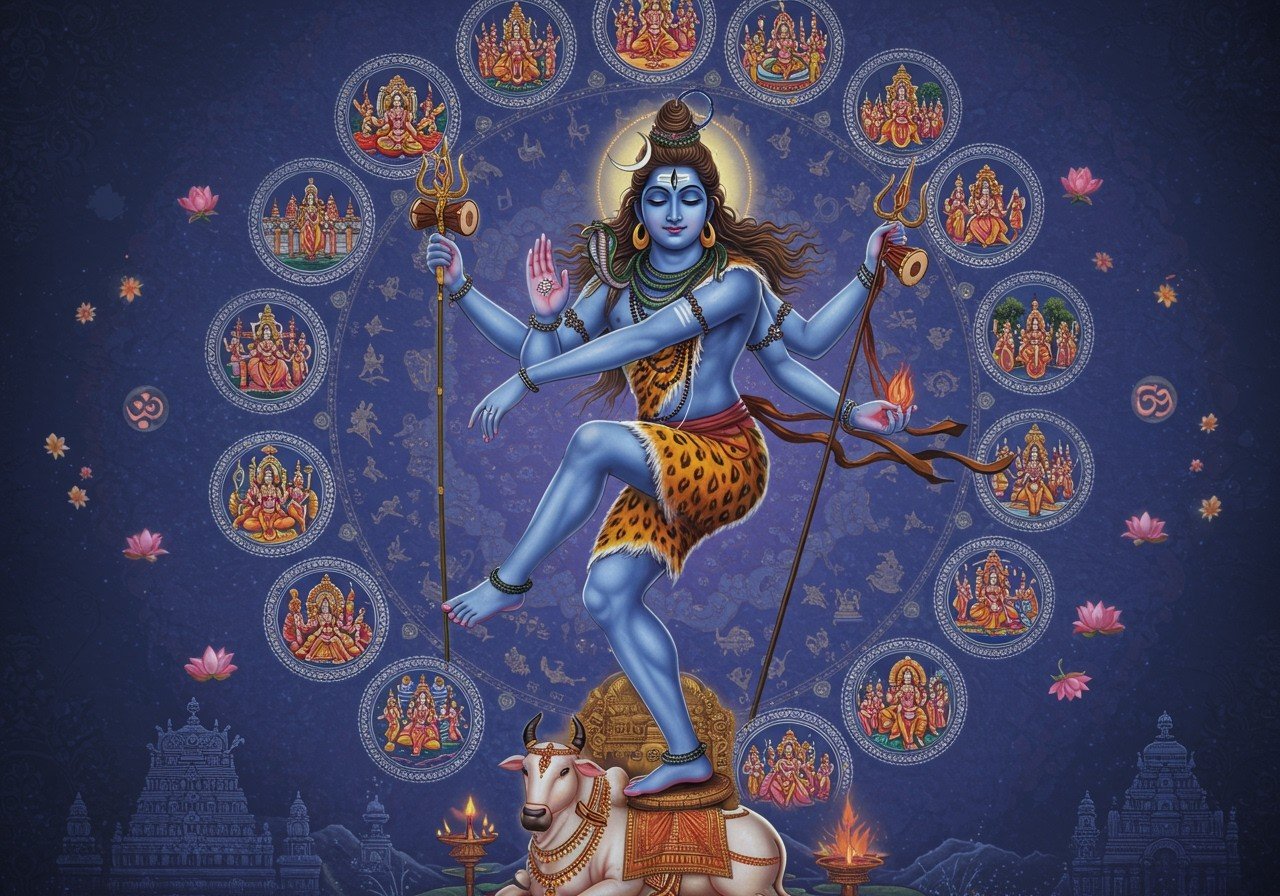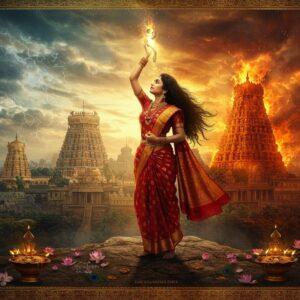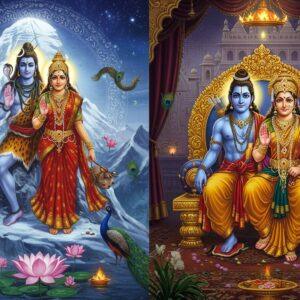
The 64 Thiruvilaiyadals are a treasured collection of divine narratives that beautifully illustrate the wondrous acts of Lord Shiva. These sacred stories, enshrined within the Thiruvilaiyadal Puranam, hold a revered position in Shaiva literature and Tamil culture. Originating in Tamil Nadu, they vividly depict Shiva’s miraculous interventions and their profound impact on the lives of his devotees. These narratives are not mere tales; they are powerful expressions of cultural and spiritual values deeply embedded within the Hindu tradition, shaping the beliefs and practices of countless followers across generations.
Unveiling the Origins and Compilation of the Thiruvilaiyadal Puranam
The Thiruvilaiyadal Puranam stands as a historical testament to Tamil Shaivism, attributed to the revered poet-saint Paranjothi Munivar. This collection, compiled in the 16th century, encapsulates the essence of Tamil Shaiva theology. The Puranam masterfully intertwines mythology with moral teachings, presented in a captivating poetic style. Deeply influenced by the Sangam period, it played a pivotal role in the flourishing of the Bhakti movement. This sacred text serves as a vessel, preserving and transmitting spiritual wisdom through generations via its captivating narratives.
A Closer Look at Select Thiruvilaiyadals
The Thiruvilaiyadal Puranam’s narratives offer us glimpses into Lord Shiva’s divine interventions. They are not just stories; they are profound lessons interwoven with engaging storytelling. Let’s explore some of these captivating narratives:
-
The Mango of Truth: This tale portrays Lord Shiva testing the devotion of his sons, Ganesha and Murugan, with a challenge involving a sacred mango. Murugan, known for his speed, embarks on a journey to circle the world. However, Ganesha, embodying wisdom, chooses to circle his parents, thereby fulfilling the true meaning of the challenge. This story emphasizes the power of wisdom over mere physical prowess.
-
The Dance of Destruction: This narrative depicts Shiva’s awe-inspiring cosmic dance, the Tandava. This powerful dance symbolizes the eternal cycle of creation and destruction, showcasing Shiva’s dual role in the universe. It serves as a potent reminder that life itself is a continuous dance of creation and destruction, a cosmic rhythm in which we all participate.
-
The Miracle at Madurai: This story recounts Shiva’s intervention in the life of a devoted follower facing a dire predicament. This act of divine grace underscores how unwavering faith can invoke divine assistance in times of need. It highlights the compassionate nature of the divine and its responsiveness to sincere devotion.
-
The Story of Dharumi and Nakkeerar: This Thiruvilaiyadal narrates a fascinating encounter where Shiva appears as a poet to aid Dharumi in a literary competition. However, Nakkeerar, a learned scholar, critiques the poem, leading to a thought-provoking confrontation with Shiva himself. The tale beautifully explores themes of divine intervention and the complexities of artistic judgment.
-
Shiva’s Marriage to Parvati: In this heartwarming narrative, Parvati, Shiva’s future consort, is born as a fisherwoman. Shiva, disguised as a fisherman, encounters her and eventually marries her. This Thiruvilaiyadal celebrates the divine union and the unexpected ways in which destiny unfolds.
-
The Story of the Pandya King: This story recounts a humbling encounter between a proud Pandya king and Lord Shiva. Through this interaction, Shiva emphasizes the vital importance of humility and the transient nature of earthly power.
Decoding the Symbolism and Interpretations
The Thiruvilaiyadal stories are imbued with profound symbolism. They employ metaphors to convey deep spiritual truths. For instance:
-
Shiva’s Third Eye: This potent symbol represents higher consciousness and wisdom. It encourages us to look beyond the surface of things and perceive the underlying truth. It reminds us that true vision transcends the limitations of ordinary perception.
-
The Tandava Dance: This powerful metaphor encapsulates the cyclical nature of the cosmos. It symbolizes the continuous interplay of creation and destruction, reflecting the rhythm of life itself. It reminds us that change is the only constant in the universe.
-
Shiva’s Dual Nature: Shiva embodies both the ascetic and the householder, signifying the delicate balance between spiritual detachment and worldly engagement. This duality teaches us to embrace both aspects of life, finding harmony between our inner and outer worlds.
Cultural and Religious Significance
These narratives have profoundly shaped Tamil culture and religious practices. Their influence can be seen in various art forms, including:
-
Dance and Drama: Many traditional dance forms and theatrical performances draw inspiration from the Thiruvilaiyadals, bringing these divine plays to life through artistic expression.
-
Music: Numerous devotional songs and musical compositions are dedicated to these sacred narratives, further embedding them in the cultural fabric.
-
Temple Rituals: In temples across Tamil Nadu, particularly in Madurai, these divine plays are integral to rituals and festivals, fostering a deep connection between devotees and the divine.
These artistic expressions not only entertain but also serve as a medium for transmitting these timeless tales and their inherent wisdom across generations.
Modern Relevance and Interpretations
Despite their antiquity, the teachings embedded within the Thiruvilaiyadal Puranam resonate deeply in contemporary times. These stories offer valuable ethical and moral lessons, including the importance of devotion, humility, and righteousness.
They address universal human dilemmas, providing guidance for personal growth and spiritual development. Their timeless appeal lies in their ability to communicate complex philosophical concepts through engaging narratives.
How Poojn.in Enhances Your Connection with the Divine Plays
Poojn.in, India’s leading online store for cultural and religious goods, offers a wide selection of authentic puja items to help you honor Lord Shiva and commemorate his divine plays (Thiruvilaiyadals) in the comfort of your home. Enhance your spiritual practice with our carefully curated collection:
-
Rudraksha Malas: Discover sacred Rudraksha beads specifically crafted for Shiva worship, available in various sizes and qualities to suit your preferences.
-
Pure Copper Vessels: Elevate your abhishekam rituals with our selection of traditional copper vessels, known for their purity and sanctity.
-
Vibhuti (Sacred Ash): Acquire high-quality Vibhuti for applying tilak, enhancing your connection with Lord Shiva.
-
Bilva Leaves: Source fresh and dried Bilva leaves, an essential offering for Shiva puja, ensuring the authenticity of your worship.
-
Brass Lamps: Illuminate your aarti ceremony with our exquisite brass lamps, adding a traditional touch to your devotion.
-
Puja Thalis: Simplify your puja preparations with our complete thali sets, containing all the necessary items for a fulfilling worship experience.
To acquire these authentic puja items:
- Visit: www.poojn.in
- Call: 03369029784
- WhatsApp: 9476142738
We ensure proper packaging and safe delivery across India. Each item is meticulously selected to adhere to traditional standards and includes usage instructions in multiple languages for your convenience. For bulk orders or specific requirements for Thiruvilaiyadal celebrations, our dedicated customer service team is ready to assist you. We also offer special discounts for temple committees and our valued regular customers.
Embracing the Divine Wisdom
The Thiruvilaiyadal tales are timeless treasures of spiritual wisdom, inspiring reflection and offering profound insights into the divine. These divine plays of Lord Shiva not only enrich our cultural and spiritual lives but also impart practical wisdom for navigating the complexities of modern life. By cherishing these narratives, we honor our heritage and find strength and peace in the timeless lessons they offer.
Understanding the 64 Thiruvilaiyadals: Frequently Asked Questions
What exactly are the 64 Thiruvilaiyadals? These are the divine acts, or leelas, performed by Lord Shiva, demonstrating his divine powers and boundless compassion. These plays are deeply embedded in Tamil literature and hold great cultural significance.
Where can I find the Thiruvilaiyadal Puranam? The complete collection of these divine plays is documented in the Thiruvilaiyadal Puranam, a Tamil scripture. You can readily find it in bookstores and online platforms that specialize in religious texts.
What is the significance of each leela in the 64 Thiruvilaiyadals? Each leela offers a unique lesson and unveils different facets of Lord Shiva’s divine character. They showcase his wisdom, strength, and compassion, serving as a source of inspiration and guidance for devotees.
What kind of symbolism do the 64 Thiruvilaiyadals represent? These divine plays are rich in symbolism, conveying deep philosophical and moral teachings. They illustrate the triumph of good over evil, emphasize the importance of faith, and highlight the power of devotion.
Why are the 64 Thiruvilaiyadals so important in Tamil culture? These narratives are integral to Tamil culture, deeply rooted in its rich tradition of storytelling and devotion. They play a significant role in strengthening cultural identity and promoting moral values.
Can the 64 Thiruvilaiyadals be interpreted in different ways? Yes, interpretations of these divine plays can vary based on individual perspectives and cultural contexts. Scholars and devotees often find new layers of meaning and insight within these timeless narratives.
How do the stories from the 64 Thiruvilaiyadals relate to our daily lives? The stories from the 64 Thiruvilaiyadals offer valuable guidance for daily living. They inspire individuals to lead a righteous life, encourage devotion, and provide moral direction in everyday decisions.
What is the role of Lord Shiva in the 64 Thiruvilaiyadals? Lord Shiva is the central figure in these narratives. Through these 64 divine plays, he uses his divine powers to guide, protect, and teach his devotees, underscoring his omnipresence and boundless benevolence.


